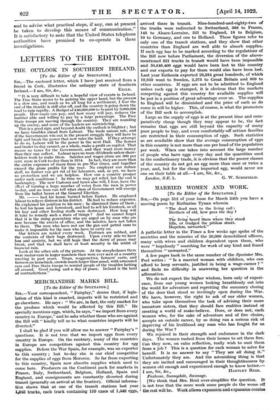MERCHANDISE MARKS BILL.
[To the Editor of the SPECTATOR.] SIR,—Your correspondent, " Fairplay," denies that, if legis- lation. of this kind is enacted, imports will be restricted and go elsewhere. He says : " We are, in fact, the only market for the produce which would be affected by this Bill." He specially mentions eggs, which, he says, "we import from every country in Europe," and he asks whether those who are against the Bill will " kindly tell us to what countries imports will be diverted."
I shall be glad if you will allow me to answer " Fairplay's " questions. It is not true that we import eggs from every country in Europe. On the contrary, many of the countries in. Europe are competitors against this country for egg supplies. Before the War Spain, for example, was an exporter to this country ; but to-day she is our chief competitor for the supplies of eggs from Morocco. So far from exporting to this country, Spain now absorbs supplies which used to come here. Producers on the Continent pack for markets in France, Italy, Switzerland, Belgium, Holland, Spain and England, and consignments are constantly diverted during transit (generally on arrival at the frontier). Official informa- tion shows that at one of the transit stations last year 16866 trucks, each truck containing HO cases of 1-,440 eggs, arrived there in transit. Nine-hundred-and-eighty-two of the trucks were redirected to Switzerland, 888 to France, 148 to Alsace-Lorraine, 821 to England, 18 to Belgium, 10 to Germany, and one to Holland. These figures refer to only one of the transit stations, and they show that other countries than England are well able to absorb supplies. If each egg has to be marked according to the regulations of the Bill now before Parliament, the diversion of the above- mentioned 821 trucks in transit would have been impossible and 50,846,400 eggs would have been lost to this country and our exports to pay for them would also have been lost. Last year Esthonia exported 28,834 great hundreds, of which 19,950 went to Sweden, 2,575 to Great Britain and 809 to other countries. If eggs are not to be admitted to England unless each egg is stamped, it is obvious that the markets competing against this country for available supplies will be put in a position of great advantage over us. The supplies to England will be diminished and the price of such as do come in will be higher. This, of course, is what the promoters of the Bill seek to accomplish.
Large as the supply of eggs is at the present time and com- paratively cheap though they may appear to be, the fact remains that eggs are still beyond the capacity of many poor people to buy, and even comfortably-off artisan families are restricted in their consumption of eggs. Such statistics as are available show that the average consumption of eggs in this country is not more than one per head of the population per week. When one takes into account the large number of people who have eggs every day and the quantities used in the confectionery trade, it is obvious that the poorer classes of the country do not get an egg more than once or twice a year, and, but for the cheap imported egg, would never see one on their table at all.—I am, Sir, &c.,










































 Previous page
Previous page